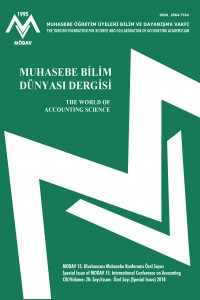Abstract
Türk Ticaret Kanunu 519. Maddesinde yedek akçe ayırma zorunluluğunun gerekçesi, “Sermayeyi korumak, şirketlerin devamlılığını sağlamak ve zararları kapatmak” olarak ifade edilmiştir. Bu çalışmanın amacı, ayrılan zorunlu yedek akçelerin sermayeyi koruma amacına hizmet edip etmediğinin araştırılmasıdır. Bu bağlamda çalışmada, ödenmiş sermayenin parasal değerindeki kaybın, yedek akçeler aracılığıyla karşılanıp karşılanamadığı analiz edilmiştir. Çalışma sonucunda, (dönem kârının ödenmiş sermaye toplamını geçtiği dönemler hariç) yasal zorunluluk olarak ayrılan yedek akçelerin, sermayenin parasal değerindeki azalışları karşılamadığı ortaya çıkmıştır. Bu durumun doğal sonucu da, şirketlerin sermayelerinin görünmez bir şekilde eriyor olmasıdır. Bu sorunun çözümü olarak ise, “yedek akçe oranının, sabit bir oran yerine paranın o yılki değer kaybı oranına bağlanması” önerilmektedir.
References
- Piketty, T. 2014. “Yirmi Birinci Yüzyılda Kapital” Yaylacık Matbaacılık, İstanbul.
- Kamuyu Aydınlatma Platformu (KAP) www.kap.gov.tr (Erişim Tarihi:07.06.2018)
- Türk Ticaret Kanunu (TTK) www.mevzuat.gov.tr (Erişim Tarihi:02.04.2018)
- Türkiye İstatistik Kurumu (TUİK) www.tuik.gov.tr (Erişim Tarihi:10.04.2018)
ANALYSIS OF THE EFFECTIVENESS OF THE RESERVES FOR THE PROTECTION OF THE CAPITAL IN THE TURKISH COMMERCIAL CODE
Abstract
The reason of article 519 of Turkish Commercial Code is expressed as “To protect the capital, to ensure the continuity to companies and to cover the losses” in the justification of article 519 in TCC. The aim of this study is to investigate whether the compulsory reserve funds that have been separated serve to protect the capital. It has been analyzed whether the loss of monetary value paid-in capital could be met through compulsory reserve funds in this context. It has been came into the open that the reserve funds which are seperated as a legal compulsory could not meet the decrease in the monetary value of the capital with the exception of periods when the period profit exceeds the paid-in capital on the result of this study. The natural consequence of this situation is that the companies’ s capital is on the wane as a invisible form. As a solution of this problem, it is suggested that “the ratio of the compulsory reserve fund must tied up to the inflation’s ratio of the year”.
References
- Piketty, T. 2014. “Yirmi Birinci Yüzyılda Kapital” Yaylacık Matbaacılık, İstanbul.
- Kamuyu Aydınlatma Platformu (KAP) www.kap.gov.tr (Erişim Tarihi:07.06.2018)
- Türk Ticaret Kanunu (TTK) www.mevzuat.gov.tr (Erişim Tarihi:02.04.2018)
- Türkiye İstatistik Kurumu (TUİK) www.tuik.gov.tr (Erişim Tarihi:10.04.2018)
Details
| Primary Language | Turkish |
|---|---|
| Journal Section | MAIN SECTION |
| Authors | |
| Publication Date | December 27, 2018 |
| Submission Date | June 18, 2018 |
| Published in Issue | Year 2018 Volume: 20 - Special Issue of MODAV 15. International Conference on Accounting |


